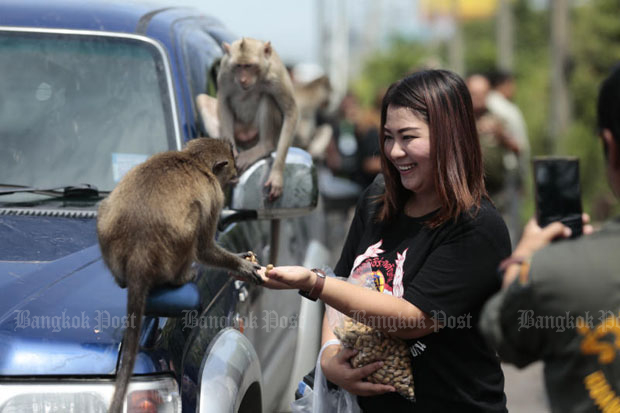
The National Legislative Assembly's animal protection committee has proposed relocating excess monkey populations to selected islands to lessen the problem of simian conflict with human communities.
The committee has been considering how best to address problematic monkey population in 11 provinces. Committee chairman Wallop Tangkananurak presented copies of their proposal to deputy governors of these provinces at the parliament on Wednesday.
"Monkey problems are both troublesome and a challenge because monkeys are clever, fast and agile and difficult to manage," he said.
The plan divides the provinces into three groups.
The first covers Krabi, Trang, Phuket and Amnat Charoen, places where people encroached on monkey habitats. The plan suggests reducing interaction between people and monkeys, and especially an end tro feeding them and to dumping garbage in monkey habitats.
The second group consists of Bangkok, Chon Buri, Prachuap Khiri Khan, Satun and Saraburi, where monkey habitats are surrounded by human communities.
The committee proposed sterilisation of monkeys in the four provinces to limit numbers and their relocation to more suitable areas.
The third group comprises Phetchaburi and Mukdahan provinces, where monkey habitats and communities have overlapped. Monkeys in these provinces should also be relocated, the committee recommended.
Before any of these proposals were implemented, local residents would be asked if they could co-exist with monkeys. If they could, monkeys would be sterilised. If they could not, monkeys would be relocated to monkey colonies, Mr Wallop said.
Pol Gen Pongsapat Pongcharoen, deputy head of the NLA committee, said sterilisation was a solution but was not enough in itself to control monkeys' reproduction capability.
"Islands will be turned into monkey colonies, places where monkeys can live happily until the end of their lives," he said.
Officials initially eyed five islands of Phuket province as such colonies - Koh Ngam, Koh Payu, Koh Tanan, Koh Pae and Koh Malee. Adequate sources of food and water would be developed there to support the monkey colonies.
There would be public hearings on the idea, Pol Gen Pongsapat said. If people disagreed, other solutions would be considered.
Lop Buri is another province with a problem. About 12,000 monkeys live alongside human communities there. Proposed solutions started with a plan to relocate monkeys to Khao Phraya Doen Thong mountain in Phatthana Nikhom district.
Other provinces with monkeys could look to Lop Buri as their solution model.